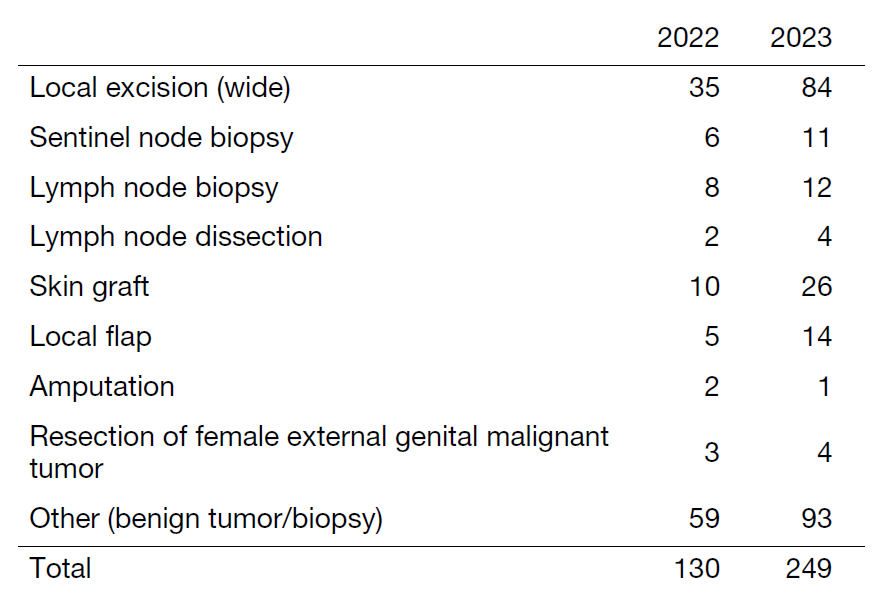Annual Report 2023
Department of Dermatologic Oncology
Akira Takahashi, Shunichi Jinnai
Introduction
The Department of Dermatologic Oncology began full time practice in April 2022 with two dermatologists. The department provides surgical treatment and chemotherapy for cutaneous malignancies, as well as supportive care for skin disorders associated with the treatment of carcinomas in other departments.
The Team and What We Do
The department has two staff dermatologic oncologists. In FY2023, there were a total of 147 new cases of major skin cancers, including 35 cases of malignant melanoma, 32 cases of squamous cell carcinoma, 30 cases of basal cell carcinoma, etc. The number of surgeries and the number of patients treated with immune checkpoint inhibitors and other drugs in FY2022-2023 are shown in Tables 1 and 2, respectively. In addition, the number of first-time supportive care patients with skin disorders associated with cancer treatment was 668. Moreover, we have treated patients with advanced cases of mucosal melanoma in the nasal cavity, genital lesion, perianal lesions and uveal melanoma, although our origins are dermatologic.
Table 1. Operative procedures (total number)

Table 2. Number of patients treated with anticancer drugs

Research Activities
The main clinical studies we are conducting for cutaneous malignancies are listed below.
- COSMOS-MEL-02 (Integrated genomic and epigenomic analysis of circulating tumor DNA from patients with BRAF V600-mutant melanoma)
- Malignant melanoma treatment using brachytherapy
- Updated analysis of nivolumab and ipilimumab combination therapy in Japanese patients with advanced melanoma.
- Clinical significance of local control of primary tumour in definitive radiotherapy for scalp angiosarcomas.
- Minimally invasive surgery combined with excision and endoscopic submucosal dissection for anorectal melanoma.
- Functional preservation benefits of minimal surgery for extramammary Paget's disease.
The Department of Dermatologic Oncology is a member of the Japan Clinical Oncology Group (JCOG) Dermatologic Oncology Group and participates in multicenter collaborative studies.
- Confirmatory trial of non-amputative digit preservation surgery for subungual melanoma. (JOCG1602)
- Confirmatory trial of narrower side margins for basal cell carcinoma in Japanese population. (JCOG2005)
Education
From 2024, we will accept residents and train them to be internationally active in the central position of skin malignancy treatment in Japan.
Future Prospects
It has been suggested that the therapeutic efficacy of immune checkpoint inhibitors differs between Westerners and Asians. Thus, establishing Japanese-specific evidence in treatment strategies is necessary. Furthermore, little evidence is found for the treatment of rare skin cancers such as angiosarcoma, extramammary Paget's disease, and Merkel cell carcinoma; thus, multicenter collaborative studies are necessary for the development of treatment. Nivolumab was approved in February 2023 for epithelial skin malignancies, but evidence in real-world clinical practice is scarce and needs to be clarified. In addition, there are upcoming investigator-initiated clinical trials for novel therapeutic agents in melanoma and angiosarcoma in which we plan to participate. Regarding education, since there are few dermatologic malignancy specialists in dermatology and few training facilities, we will train dermatologic oncologists at our hospital, which is a specialized oncology training facility.
List of papers published in 2023
Journal
1. Takahashi A, Namikawa K, Ogata D, Jinnai S, Nakano E, Yamazaki N. Updated analysis of nivolumab and ipilimumab combination therapy in Japanese patients with advanced melanoma. The Journal of dermatology, 50:525-535, 2023
2. Okumura M, Ogata D, Namikawa K, Takahashi A, Akiyama M, Yamazaki N. Functional preservation benefits of minimal surgery for extramammary Paget's disease. Experimental dermatology, 32:1644-1650, 2023
3. Mizuta H, Yoshida A, Takahashi A, Namikawa K, Ogata D, Yamazaki N. Congenital dermatofibrosarcoma protuberans with PDGFB gene rearrangement detected using fluorescence in situ hybridization. Dermatology online journal, 29:2023
4. Okumura M, Ogata D, Namikawa K, Takahashi A, Nishimura Y, Mori T, Yoshida H, Akiyama M, Yamazaki N. Adenosquamous carcinoma of the Bartholin gland treated with surgery and radiotherapy. European journal of dermatology, 33:309-311, 2023
5. Nishimura Y, Ryo E, Inoue S, Kawazu M, Ueno T, Namikawa K, Takahashi A, Ogata D, Yoshida A, Yamazaki N, Mano H, Yatabe Y, Mori T. Strategic Approach to Heterogeneity Analysis of Cutaneous Adnexal Carcinomas Using Computational Pathology and Genomics. JID innovations, 3:100229, 2023
6. Wada S, Ogata D, Kashihara T, Okuma K, Eto H, Nakano E, Takahashi A, Namikawa K, Igaki H, Yamazaki N. A single-center retrospective analysis of prognoses in patients with melanoma brain metastases and effectiveness of treatment in Japan. Cancer medicine, 12:21933-21943, 2023
